
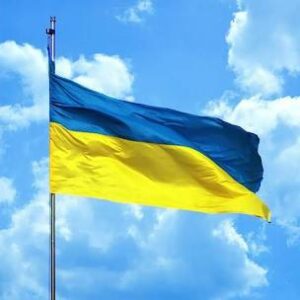
Pray for the people of Ukraine and Gaza.
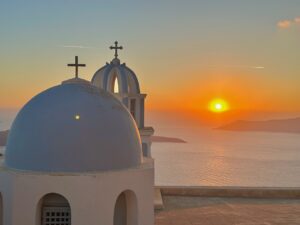
I’m old, now. I won’t see Greece again.
Nevertheless, I often still go there. On my trips I kept a daily travel journal. I wrote one time: “Why am I keeping this journal? So when I get old and can’t travel here any more, I’ll be able to read this and live it all again.” And so I am. And so I do.
Why am I so attached to Greece? Partly because it’s Greece. Wow! (I’ll explain in a few minutes.) Partly because it was there that I met Saint Nicholas and, later, Saint Nektarios. Or rather they met me. All this will come clear, if you’ll come along on my many trips to Greece – which I’ll not publish sequentially, but rather from time to time. We do need to come home occasionally, lest we become travel weary.
But let me explain about Saint Nicholas now. In the last two Posts I told you only part of the story of how I finally became Orthodox. What I did not tell you was this: The real actor here was neither me nor the bishop who kicked me out of the Episcopal Church. Rather it was Saint Nicholas. It was in Greece that Saint Nicholas first intervened in my life and began the strange process by which he made me Orthodox and by which he founded Saint Nicholas Church in Cedarburg, Wisconsin, USA, 5000 miles away.
But we’re getting ‘way ahead of the story.
This Post will be chiefly a Travelogue, slightly of Western Europe but chiefly of Greece. At the end Saint Nicholas will make his first surprise appearance.
So, I hope you’ll come along with me on this trip when, for the first time, I ventured east “of the line in the Adriatic where the Filioque drops out of the Creed” (as Patrick Leigh Fermor so cleverly put it) and where some remarkable things began to happen.
A Summer Sabbatical
I can’t believe it was forty years ago. That trip is still so alive to me that it might have been last summer.
I was a demoralized middle-aged Episcopalian (Anglican) priest, a “Traditional” Christian. As I told you last week, I had become an Anglican, hoping it would become “Western Orthodoxy”. We had fought hard to maintain – and then recover – Traditional Christianity in the Episcopal Church. By the early 1980s I knew the battle had been lost. Why didn’t I just become Orthodox? Because the Orthodox Church still seemed so “foreign” to me. Besides, I loved my people, and I knew they loved me, and I felt responsible for them. Plus Dianna and I had kids to get through college. I didn’t see how I could make a move. I couldn’t see any honest way forward or any way out. It was driving me crazy.
So in my church I tried to teach Orthodox doctrine, as best I understood it – but I knew it was a rearguard action. It was going to come to nothing. I was becoming negative and rigid, driving my parish and my family up the wall. God help me, I remember shaking my finger at my people as I preached. Me?
By 1985 I had been rector (pastor) of Saint Boniface Episcopal Church for nearly twenty years. Our Vestry (Parish Council) thought maybe I just needed a break, so they generously gave me the summer off, with money for traveling. Neither they nor I had any idea what was about to happen. *
- For one thing, both I and the chairman of the Vestry would soon become Orthodox. I’ve wondered if they thought it was a plot! (It wasn’t.)
So for a month my wife Dianna and I, with our teenagers Jennifer and David, traveled western Europe. We searched in vain for family connections in Wales, but were perhaps overly successful with “Onkel Hermann” in Germany. Everywhere an Olnhausen had ever sneezed: “Ve vill stop und take a picture.” Tourist advice: If you can afford to go to Switzerland, do it. I’ve never seen such beauty. Also, go to Rome in spring or fall, not in the heat of high summer.

A brief “religious” report from that part of the trip: I wanted to venerate (Anglican style) Saint David at his Cathedral in the far west of Wales, and at Durham Cathedral the Venerable Bede whom I’ve loved from the first time I met him. In both cases: a candle burning, no pilgrims, nobody praying. (We had found the same at Saint Alban’s Cathedral on an earlier trip.)
The gorgeous Notre Dame in Paris was a tourist trap, again with nobody praying. One Roman Catholic church in Switzerland had some life in it, and I even understood some of the sermon. Saint Peter’s Basilica in Rome was definitely a holy place.
That’s all I discovered about the practice of religion in Western Europe.
And then… I had always wanted to see Greece.
So with Dianna’s approval (what ever possessed her?) there I stood alone at Leonardo da Vinci airport, tears in my eyes, watching my family fly off for home.
But I was going to Greece!
I caught an overnight train south out of Roma Tiburtina. I indulged myself and got a private room, snuggled into my soft bed and fell asleep as the train, oh so smoothly (Amtrak, are you listening?), sped south for Brindisi, the ancient Roman port to the East. * At 6:30 a.m. a knock on the compartment door: “Here is your cappucino, sir.” Can life be better than that?
- The overnighter has now been replaced by this 155 mph high-speed train, which would have made life much easier for Caesar and his troops.

The scenery had changed – we flew past hills topped with white villages – and arrived on time. (Amtrak, are you listening?) After some exploring, I walked to the dock and found the overnight ferry to Greece.
Who but a clergyman would choose this kind of fling? I was on my way to a Church conference on Crete, intended to introduce Americans to Greece and Greek Orthodoxy. I had no intention of becoming Orthodox, though I was curious. I had wondered if maybe after I retired… maybe.
What I really wanted was Greece. Greece fascinated me. I think it started when I was a teenager. My cousin Don had married a Greek girl, and her parents invited us to their house for Pascha. What was that? I didn’t know. (In case you don’t, it’s Orthodox Easter.) They served us numerous mysterious Greek foods and goodies, and her father gave me a little (but not too much) ouzo, an anise-flavored Greek aperitif. After that, an indefinable feeling about Greece lingered with me and inexplicably became stronger. We never know how the smallest things may change the course of our lives, do we?
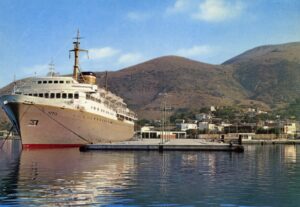
Back to the ferry: I had intended to spend the night in a seat on deck – until I took one look at the rickety seats. So I went down below to see if I could get a room. “Yes, mister, no problem”, said the Greek agent. “How much?” He said 350 drachmas or something like that. It sounded like a small fortune. I asked “How much in US dollars?” He said “$10”. I stared at him. A private room for 10 bucks?! He said “Too much?” Before I could think I blurted out “No. Too little!” Now it was his turn to stare at me: Another crazy American. I gave him $10 quickly and took the room.
Greece
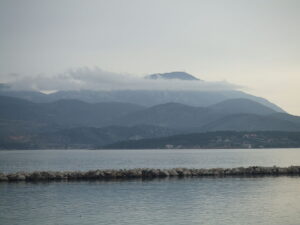
Next morning I looked out the porthole of my little room and saw in the distance, in the grey before dawn, the outlines of the first Greek islands, and I thought “That’s it. This is my place.” How did I know that? I have no idea. I can’t explain it. It just “was”. And still is.
I’d had experiences like that before. Now, please understand: I’m not some glassy-eyed mystic who floats around receiving indecipherable messages from wherever. But once in a great while I have suddenly just “known” certain things, things which have remained part of me for the rest of my life. For example, the first time my parents and I drove over the border into Wisconsin, I knew Wisconsin is the right place for me. I have lived in Wisconsin for 57 years now. Every time I tried to leave, something prevented it. A few other things have “hit” me like this: The Reality of God. That I should be ordained. That Jesus loves me. And my wife: Two weeks after our first date a friend of mine asked if I wanted to go with him to Europe the next summer. I said, “No. I think I’m getting married next summer.” (Dianna didn’t know that yet.) And so we did.
So now it was Greece. On my trips over the years, every time the airplane descended into Athens – that chaotic, noisy, if-I’ve-got-to-be-honest-with-you-not-very-beautiful metropolis – I felt it again. “I’m home.” But then again, when the airplane descended into Milwaukee: “I’m home again.” My life since 1985 has been torn between two places. When I was in Greece, I missed Wisconsin. When I’m here, I miss Greece. Like right now: I cannot begin to tell you how my heart aches for Greece. It’s a wonderful terrible blessing.
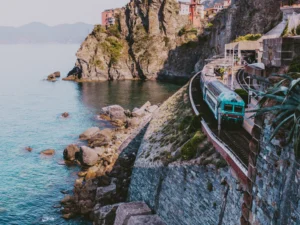
We docked in Patras, the western port of Greece, and I boarded a little train for Athens which was, well… Amtrak, I take it all back. You’re a lot better than that! I was discovering that Greece in 1985 was in some ways still almost third world. We climbed high, high, higher with cliffs beside us on the left, the sea far below to the right. The train bounced and lurched so much that I thought surely it would plunge over the edge and kill us all. (It didn’t. Δόξα τω Θεώ.)
It was a very short distance from the rail station (“σιδηροδρομικός σταθμός” – got that?) to the hotel. I could see the taxi drivers conspiring: An American! “$15, mister.” “$15, mister.” “$15, mister.” So $15 it was.
I spent one night in a comfortable room in an elegant old world Athens hotel, just off Syntagma Square in the city center, for $27 a night. Greece in those days was cheap. Next afternoon at the international airport (Aerodromeo/Aεροδρόμιο) the third world re-emerged. Despite the mid-summer Mediterranean heat, there was no air conditioning. People were sweating, the doors were open, dogs were running about and barking at travelers of whom they disapproved. (May I digress to describe Athens’ present Aerodromeo, the most convenient efficient airport I ever came across, and I traveled a good bit. A Greek friend explains that it was designed not by Greeks but by Germans!)
It was an hour’s plane ride south to Crete – the Big Island in the middle of the Mediterranean, almost halfway to Africa – and the city of Chania. (No, no, no… you say HanYA, with a guttural “H” in the back of your throat, and soft “A”s like the Brits say them). The thrill of being 5530 miles away from home! but, on the other hand, 5530 miles away from my family.

The conference was at the Orthodox Academy, on the Aegean shore in northwest Crete, next to Gonia Monastery and just outside a small village, Kolymbari. At that far west end of Crete, a large uninhabited peninsula juts out to the north. The Academy sits at the base of the peninsula, facing east, just far enough out that you can see ‘way down the north coast of Crete – at night the lights of village after town after village for I don’t know how many miles.
The Academy immediately captivated me: the white buildings, the clean simple open architecture with the rounded arches, the marble floors, all so different from the Western church styles (whether dark medieval or Roman classical or boring modern) I was accustomed to.
And the Greek food – moussaka, stuffed peppers, tomatoes and cucumbers such as I had never tasted before. Feta cheese (where had you been all my life?) and I wish you could just once taste a sweet Cretan watermelon. The Greek word is KarPUzi (καρπούζι). Isn’t that perfect for a big corpulent melon?
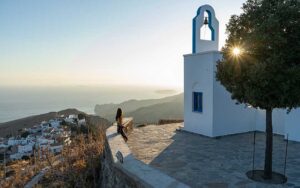
And the churches. Everywhere I looked – churches. Greece is covered with churches and chapels. Often, while driving, you can see several at a time. On many mountaintops are chapels dedicated to the Prophet Elias, prononced eLEEas (Anglicized into “Elijah”, for reasons I do not know). Once there were temples to the sun god Helios up there. When he was demoted, Saint Elias, who was taken up into the heavens in a chariot of fire, fittingly took over. * I discovered that Orthodoxy, rather than simply condemning pagan things, used them, “converted” them. I was told that on the feast day of Aghios Elias, July 20, people climb up to the chapels to celebrate Divine Liturgy. Up there? Really?
- The Greeks don’t pronounce the “H”, so “Elios” =“Elias”. Easy transition.
And the sun. Little wonder ancient Greeks worshiped the sun. I was tempted myself. The Light is so brilliant, so indescribably luminous that it requires a capital letter. That Light reveals the crags of the bleak rugged Cretan mountains, and the many blue shades of the ever-changing sea, and somehow things many miles away can be seen clearly.
And the smell of the herbs – oregano? thyme? basil? so fragrant they kept me awake at night. As did the mosquitoes. I concluded that mosquito netting is ‘specially designed to let the mosquitos in but not out.
…. I was intending to tell you about the conference, but got sidetracked in a wonderful way.
The Conference
The conference was led by intelligent, well-educated, well-spoken laypeople, men and women. I discovered that many Greek Orthodox theologians and scholars are not ordained. A good thing. Much of Western Christianity is dominated by us clergy.
We were told more than once in no uncertain terms – almost as if we were being accused of it – how the Crusaders ravaged the Great City Constantinople, and the Greeks have not forgotten and never will.
They tried to teach us a little Greek so we could at least say “kalymera/καλή μέρα” (good day) to the villagers. One woman asked why she kept getting such odd looks from the locals as she greeted them saying “καλαμάρι! / calamari!” (“squid”, if you don’t know)
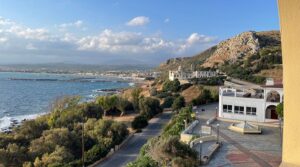
Then came an interesting development.
We Americans came from various backgrounds. We heard many talks and discussed many things. Every time we talked about religion I agreed with the Orthodox, right down the line. Orthodox worship at the monastery next door seemed very “unreformed”, even from my traditional Anglo-Catholic perspective. (Solid icon screens blocking off the altar area – really?) I couldn’t understand the Greek. But still it was so fascinating, so deep, so mysterious, so holy.
We visited churches and ancient pre-Christian sites, even had an audience with the kindly Archbishop of Crete.
We went to a village festival. Now, in Greece there is officially separation of Church and state. Well, officially, but in reality only kind of, sort of, in a way, mostly. For example, who blesses the opening session of the Greek Parliament? The Archbishop of Athens, of course.
However, there is definitely no separation of Church and life. For example, in Greek towns and villages, the annual festivals [Panigyri / πανηγύρι] are held on the local saint’s day. They begin with Divine Liturgy, then proceed with a huge meal outdoors in the village square, followed by traditional dancing. I remember sitting at table trying hard to eat octopus (popularly “ktopodi”), as the wine and ouzo flowed freely. In that regard, across from me two young deacons in their black robes were definitely, shall we say, very happy.
We visited a little church for Divine Liturgy. The old women, after receiving Holy Communion, stopped and hugged and said a few words to each other. That would have seemed so irreverent in my Episcopal church back home. People would have been shocked, just shocked. But here it seemed right, sweet.
Regarding Orthodoxy, I kept getting that “just right” feeling over and over. I couldn’t explain it, but it was there, and it was making me glad and uncomfortable.
The Face
Sometimes we remember things wrong, so I’ve gone back to my travel journal. Yes, I remember it right. In the entry for Saturday August 3, 1985, I see that in the evening we visited the local Bishop Irenaeos and ate with him and some of his people in the courtyard outside his chapel. He was known both for his holiness and for his social work, defending the poor, speaking up for his people. Once he had been transferred elsewhere, and the people went on strike, barred the entrance to the cathedral, till they got him back again!
I vividly remember him and his clergy sweetly singing the Orthodox Vespers hymn Phos Hilaron (“O joyful light, pure brightness of the everliving Father in heaven…”) on that lovely summer evening. His good humor, and their love and affection for each other showed so clearly. Here is what I wrote that night after we got back to the Academy: “Wonderful! Such joy! Bishop Irenaeos is a holy man. This is the way the Church should be… don’t forget the Bishop’s face: serene, holy, happy.”
I did not forget that face. I would soon see it again – in a church goods store near the Cathedral in Athens. It was on an icon of Saint Nicholas. Saint Nicholas was about to make his first move.
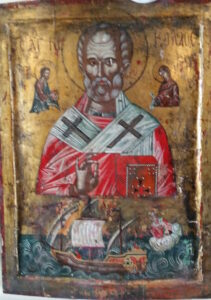
Next Week: 1) Orthodoxy in action on a Greek island. 2) I bring Saint Nicholas home, where he gets to work in a startling way.
Week after Next: We’ll see.
Thank you for another jewel, father bill. Reading your blogs about Greece tempts me greatly to travel there someday, including a visit to Mt. Athos.